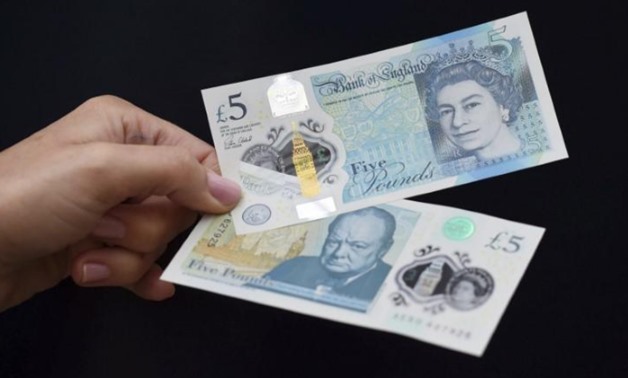
The new polymer 5 pound Sterling note featuring Sir Winston Churchill, is unveiled at Blenheim Palace in Oxfordshire, Britain June 2, 2016. REUTERS/Joe Giddens/Pool
LONDON - Sterling slid against the dollar and the euro on Monday after UK factory output showed its biggest monthly drop since 2012, underlining that economic momentum in the UK remains fragile and will likely need to improve before interest rates are raised.
Manufacturing output dropped by 1.4 percent month-on-month in April after a 0.1 percent decline in March — a bigger drop than any economist had forecast in a Reuters poll that pointed to growth of 0.3 percent.
The broader measure of industrial output fell 0.8 percent on the month, but was up 1.8 percent on the year — again weaker than all forecasts.
“This is not the start (for the British economy) the market was hoping for in Q2,” said Kallum Pickering, a UK economist at Berenberg.
“It’s going to take the Bank of England more than one quarter,” of decent economic numbers before it is ready to hike rates, Pickering said, predicting the next rate rise in November.
After trading up 0.1 percent, the pound fell following the data release and traded down 0.3 percent versus the dollar to $1.3368.
The drop versus the euro was even more pronounced as the single currency was stronger across the board. The pound slumped 0.6 percent to 88.260 pence per euro.
The figures do little to support the view of Bank of England Deputy Governor Dave Ramsden, who last week said data so far had suggested the economy’s weak start to 2018 would prove temporary.
The Bank of England said in May that it did not intend to raise rates until it saw proof that the economy was stronger.
Pickering said that with British wage growth improving, Monday’s data reinforced the view that the British economy would need to be more reliant on its consumers in the months ahead, although he noted that monthly industrial production numbers were particularly choppy.
This week could prove a volatile one for the pound, with a parliamentary vote on amendments to Britain’s EU withdrawal bill takes place on Tuesday.
Brexit headlines have returned to dominate sterling trading in recent days, with the EU chief negotiator last week questioning Britain’s “backstop” proposals to deal with the Irish border issue - a sticking point in moving forward negotiations for Britain and the EU’s divorce.
ING analysts predicted that a loss of one of the parliamentary votes could lessen the chances of a “hard” or disorderly Brexit and boost sterling.

Comments
Leave a Comment